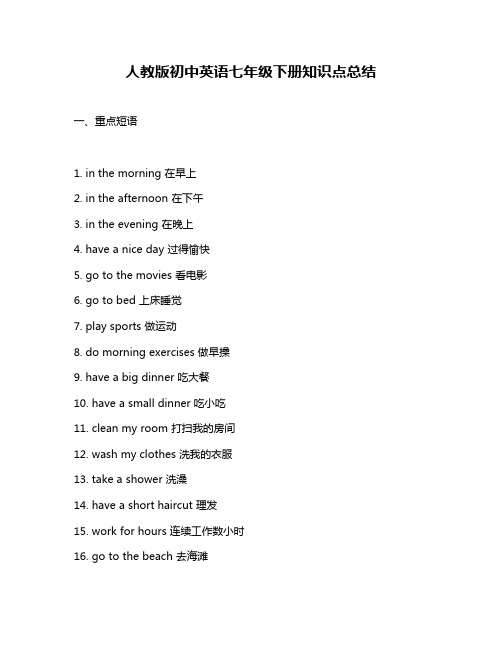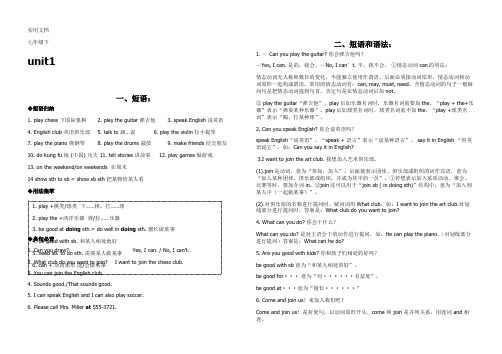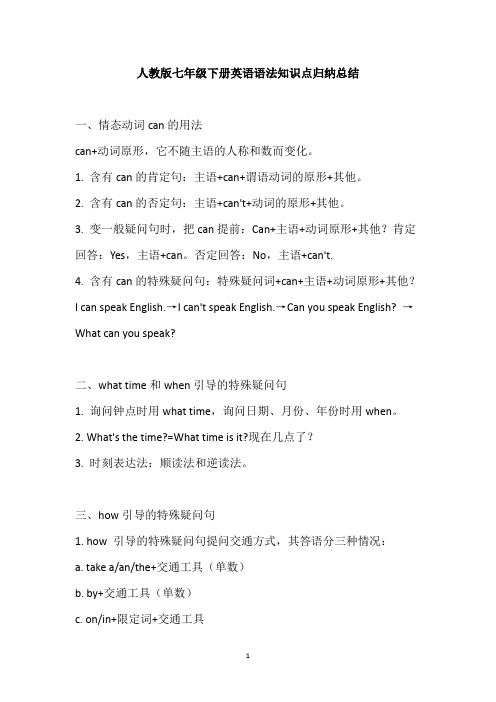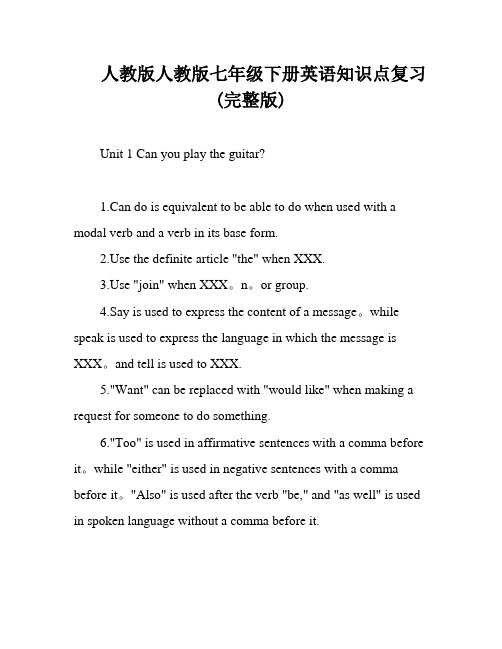人教版七年级英语下册总复习知识点考点总结归纳
人教版初中英语七年级下册知识点总结

人教版初中英语七年级下册知识点总结一、重点短语1. in the morning 在早上2. in the afternoon 在下午3. in the evening 在晚上4. have a nice day 过得愉快5. go to the movies 看电影6. go to bed 上床睡觉7. play sports 做运动8. do morning exercises 做早操9. have a big dinner 吃大餐10. have a small dinner 吃小吃11. clean my room 打扫我的房间12. wash my clothes 洗我的衣服13. take a shower 洗澡14. have a short haircut 理发15. work for hours 连续工作数小时16. go to the beach 去海滩17. on the weekend 在周末18. listen to music 听音乐19. have a party 举办聚会20. watch TV 看电视21. play computer games 玩电脑游戏22. in the pool 在游泳池里23. go to the zoo 去动物园24. in the mountains 在山里25. have fun 玩得开心26. the great wall 长城27. many places of interest 名胜古迹28. be ready for 为……准备好29. stay healthy 保持健康30. how much 多少31. would you like 一些……吗?32. some noodles 一些面条33. order a pizza 定一个披萨饼34. make a phone order 电话订购35. would you like to do sth 你愿意做某事吗?36. want to do sth 想做某事37. would you like +名词你愿意要……吗?38. would you like +动词不定式你愿意……吗?39. choose some food 选择一些食物40. order the food 订购食物41. be careful 当心;小心42. not much 不多;少量的43. be ready to do sth 准备好做某事。
人教版七年级英语下册各知识点归纳总结

七年级下unit1一、短语:◆短语归纳1. play chess 下国际象棋2. play the guitar 弹吉他3. speak English 说英语4. English club 英语俱乐部5. talk to 跟…说6. play the violin 拉小提琴7. play the piano 弹钢琴8. play the drums 敲鼓9. make friends 结交朋友10. do kung fu 练 (中国) 功夫 11. tell stories 讲故事 12. play games 做游戏13. on the weekend/on weekends 在周末14 show sth to sb = show sb sth 把某物给某人看◆用法集萃◆典句必背1. Can you draw? Yes, I can. / No, I can’t.2. What club do you want to join? I want to join the chess club.3. You can join the English club.4. Sounds good./That sounds good.5. I can speak English and I can also play soccer.6. Please call Mrs. Miller at 555-3721.二、短语和语法:1. — Can you play the guitar? 你会弹吉他吗?—Yes, I can. 是的,我会。
—No, I can’t. 不,我不会。
①情态动词can的用法:情态动词无人称和数目的变化,不能独立使用作谓语,后面必须接动词原形,情态动词和动词原形一起构成谓语。
常用的情态动词有:can, may, must, need。
含情态动词的句子一般疑问句是把情态动词提到句首,否定句是在情态动词后加not。
人教版七年级下册英语语法知识点归纳总结

人教版七年级下册英语语法知识点归纳总结一、情态动词can的用法can+动词原形,它不随主语的人称和数而变化。
1. 含有can的肯定句:主语+can+谓语动词的原形+其他。
2. 含有can的否定句:主语+can't+动词的原形+其他。
3. 变一般疑问句时,把can提前:Can+主语+动词原形+其他?肯定回答:Yes,主语+can。
否定回答:No,主语+can't.4. 含有can的特殊疑问句:特殊疑问词+can+主语+动词原形+其他?I can speak English.→I can't speak English.→Can you speak English? →What can you speak?二、what time和when引导的特殊疑问句1. 询问钟点时用what time,询问日期、月份、年份时用when。
2. What's the time?=What time is it?现在几点了?3. 时刻表达法:顺读法和逆读法。
三、how引导的特殊疑问句1. how 引导的特殊疑问句提问交通方式,其答语分三种情况:a. take a/an/the+交通工具(单数)b. by+交通工具(单数)c. on/in+限定词+交通工具---How do you go to school every day?---I take a bus to go to school every day./I go to school by bus every day./I go to school on the bus every day.2. how far 用来提问距离,多远,其答语分为两种:(1)用长度单位表示:It is five kilometers.(2)用时间表示:It’s twenty minutes’walk.3. how long 用来提问时间,意为多久回答常用“for+段时”。
人教版七年级下册英语知识点总结 总复习

Unit 1 Where’s your pen pal from?一.词组 1.来自... ______________=_______________ 2.笔友______________ 3.好恶;爱憎_______________4.在...居住_______________5.讲某种语言_______________6.做体育运动_____________7. 去看电影______________8. 给某人写信______________9.在周末____________ 10.告诉某人某事_______________11.到达、抵达______________ 二.句型 1.提问某人来自哪里句型______________________ = ___________________________答语_______________________= ___________________________2、提问某人居住在哪里:Where do/does+主语+live? 答语:主语+live/lives in…Unit 2 Where’s the post office?一.词组1.邮局_____________2.投币式电话_____________3. 紧靠…____________4.在...对面________________5.在...前面________________6.在...和...之间________________7.在街上_____________8.在附近________________9.在右边/在左边______________ 10.一直走_______________ 11.喜欢做某事________________12.过得愉快________________ =____________________=________________ 13.弹奏乐器__________________14.向右/左转___________ 15.散步____________16.去...的路_____________17.让某人做某事________________18.乘出租车______________19.沿着...走____________19.穿过.. _____________ 20. 旅途愉快__________________21.到达________________ 22. 在...开始的时候____________________ 23.在...结束的时候_________________二.句型Asking ways: (问路)1.Where is (the nearest) ……?(最近的)……在哪里?2._________________________________ 你能告诉我去……的路吗?3._________________________________ 我怎样到达……呢?4.Is there …… near here / in the neighborhood? 附近有……吗?5._________________________________ 哪条是去……的路?Showing the ways: (指路)1.Go straight down / along this street. 沿着这条街一直走。
人教版七年级下册英语知识点归纳

人教版七年级下册英语知识点归纳
一、词汇知识点
1. 名词:表示人、事物或物体的名称。
2. 动词:表示动作或状态的词语。
3. 形容词:描述人或事物的特征或性质。
4. 副词:修饰动词、形容词或其他副词,表示时间、地点、程
度等。
5. 介词:连接名词或代词与其他词性的词语,表示位置、时间、原因等。
6. 数词:表示数量或顺序的词语。
7. 代词:替代名词的词语,例如人称代词、指示代词等。
8. 冠词:放在名词前面,用来限定名词的词语。
二、语法知识点
1. 现在进行时:表示现在正在进行的动作或状态。
2. 一般现在时:表示经常、反复或总是发生的动作或状态。
3. 一般过去时:表示过去某个时间发生的动作或状态。
4. 一般将来时:表示将来要发生的动作或状态。
5. 祈使句:表示请求、命令、建议等的句子类型。
6. 疑问句:表示疑问的句子类型。
7. 定冠词与不定冠词的用法:表示特指或泛指的名词前需要使用不同的冠词。
三、阅读理解技巧
1. 细节理解:根据文章中的具体信息来回答问题。
2. 推理判断:根据已有信息进行推理,得出结论。
3. 主题概括:对文章的主要内容进行概括。
4. 上下文猜词:根据上下文的语境猜测单词的意思。
5. 标题选取:选择合适的标题来概括文章的内容。
以上是人教版七年级下册英语知识点的简要归纳,希望对你有所帮助!。
人教版七年级下册英语知识点总结

人教版七年级下册英语知识点总结学习的方法--工作中学习,学习后工作,做比说重要,习比学有效。
下面本文库为您推荐人教版七年级下册英语知识点总结。
【一:Unit 1 Can you play the guitar 】1、can+动词原形,它不随主语和数而变化。
(1)含有can的肯定句:主语+can+谓语动词的原形+其他。
(2)变一般疑问句时,把can提前:Can+主语+动词原形+其他肯定回答:Yes,主语+can。
否定回答:No,主语+can’t.(3)含有can的否定句:主语+can’t+动词的原形+其他。
(4)含有can的特殊疑问句:特殊疑问词+can+主语+动词原形+其他2、may+动词的原形。
(may为情态动词)一般疑问句是把may提前,肯定回答是:Yes,主语 +may。
否定回答是:No,主语+mustn’t。
或please don’t。
join+某个组织,俱乐部,party,参军,党派等"加入"Join sb. "参加到某人中" join in (doing)sth "加入做......,参加某个活动" Join in=take part in +活动,比赛3、说某种语言:speak+语言4、play+球、棋、牌;play+the+乐器。
5、擅长于(做)什么:be good at +名词/动ing6、帮助某人做某事:help sb. (to ) do sth. help sb. with sth.7、我能知道你名字吗May I know your name8、想要做什么:want to do sth 例如:I want to learn about art.9、What club do you want to join I want to join the chess club and the basketball club.10、What club does Tom want to join He wants to join the swimming club .11、He can’t play the violin or the piano. Can you help kids with swimming12、Why do you want to join the English club Because I want to learn English well.【二:Unit 2 What time do you go to school 】1、what time和when引导的特殊疑问句。
期末复习人教版英语七年级下册单元重点知识点语法汇总

人教版七年级下册-单元重点语法汇总U1情态动词can的用法can是情态动词,意为“能,会”,表示某人或某物具备的能力,还可用来提出请求,没有人称和数的变化,后面直接接动词原形。
下面学习情态动词can的常见用法。
1.表示“能力”,意为“能,会”。
例句:I can speak English.我会讲英语。
2.表示“请求”或“许可”。
例句:Can you help me with my Chinese?你能帮我学汉语吗?You can go to the park after you finish your homework.你做完作业后可以去公园。
3.含有情态动词can的肯定句变否定句时,需在can后加not,其缩写形式为can’t;变疑问句时,情态动词can直接放在句首,构成一般疑问句。
例句:I can sing English songs.我会唱英文歌。
(肯定句)→I can’t sing English songs.我不会唱英文歌。
(否定句)Yao Ming can play basketball.姚明会打篮球。
→Can Yao Ming play basketball?姚明会打篮球吗?(一般疑问句)4.对Can…问句的回答可以用下面几种形式:对询问能力的问句的回答可以说“Yes,…can.”或“No,…can’t.”,表示对能力的肯定或否定;对表示请求的问句的回答可以说“OK./All right.”,表示同意对方的请求。
也可用certainly或sorry来回答。
用certainly作肯定回答,语气更肯定;用sorry作否定回答,语气则更委婉、客气。
例句:—Can you speak English?你会说英语吗?—Yes,I can.是的,我会。
—Can I see your pencil-box,please?请问,我可以看一下你的铅笔盒吗?—All right./Certainly.Here you are.可以。
人教版人教版七年级下册英语知识点复习(完整版)

人教版人教版七年级下册英语知识点复习(完整版)Unit 1 Can you play the guitar?1.Can do is equivalent to be able to do when used with a modal verb and a verb in its base form.e the definite article "the" when XXX.e "join" when XXX。
n。
or group.4.Say is used to express the content of a message。
while speak is used to express the language in which the message is XXX。
and tell is used to XXX.5."Want" can be replaced with "would like" when making a request for someone to do something.6."Too" is used in affirmative sentences with a comma before it。
while "either" is used in negative sentences with a comma before it。
"Also" is used after the verb "be," and "as well" is used in spoken language without a comma before it.7."Be good at" is used to XXX or activity。
- 1、下载文档前请自行甄别文档内容的完整性,平台不提供额外的编辑、内容补充、找答案等附加服务。
- 2、"仅部分预览"的文档,不可在线预览部分如存在完整性等问题,可反馈申请退款(可完整预览的文档不适用该条件!)。
- 3、如文档侵犯您的权益,请联系客服反馈,我们会尽快为您处理(人工客服工作时间:9:00-18:30)。
人教版七年级英语下册总复习知识点考点总结归纳人教版七年级英语下册知识点1. across from ……在……的对面 across from the bank 在银行的对面2. next to……紧靠…… next to the supermarket 紧靠超市3. between……and……在……和……之间between the park and the zoo 在公园和动物园之间among 表示位于三者或三者以上之间4. in front of……在……前面 There is a tree in front of the classroom. 课室前面有棵树。
in the front of……在……(内)的前部 There is a desk in the front of the classroom.课室内的前部有张桌子。
5. behind……在……后面 behind my house 在我家后面6. turn left/ right 向左/右拐on the left/right of……在某物的左/右边 on the left of our school 在我们学校的左边on one’s left/right 在某人的左/右边 on my left在我左边7. go straight 一直走8. down /along……沿着……(街道 down/along Center Street 沿着中央街9. in the neighborhood=near here 在附近10 welcome to……欢迎来到……11. take /have a walk 散步12. the beginning of…………的开始,前端at the beginning of……在……的开始,前端in the beginning 起初,一开始13. have fun=have a good time=enjoy oneself 玩得开心,过得愉快14. have a good trip 旅途愉快15. take a taxi 坐出租车16. 到达:get to +地方get here/ there/ home 到这/那/家 arrive in +大地方 I arrive in Beijing. arrive at +小地方I arrive at the bank. reach +地方17.go across 从物体表面横过 go across the street横过马路go through 从空间穿过 go through the forest穿过树林18.on + 街道的名称。
Eg: on Center Streetat + 具体门牌号+街道的名称 Eg: at 6 Center Street 重难点解析1.enjoy doing sth 享受做某事的乐趣,喜爱做某事 I enjoy reading. 我喜爱读书。
到目前为止,我们学了两个特殊的动词finish和enjoy,都是要带 doing.I finish cleaning the room. 我扫完了这间屋子。
2.hope to do sth 希望做某事 I hope to pass this exam. 我希望通过这次考试。
hope +从句 I hope tomorrow will be fine. 我希望明天将会晴朗。
(从句即是一个小句子,这个小句子又放在大句子中,从属于大句子,所以叫从句。
如tomorrow will be fine是一个从句,它又放在I hope 的后面,形成句中有句。
)3. if 引导一个表示假设的句子。
If I have much money, I will go to the moon. 如果我有许多钱,我就会去月球。
If you are hungry, you can buy some food in the supermarket.如果你饿了的话,你可以在超市买一些食物。
人教版七年级英语下册知识点短语:1.do one’s homework 做某人的作业 do housework 做家务2.talk on the phone 在电话里交谈, talk about……谈论……talk to(with)sb 和某人交谈3.write a letter 写信 write a letter to sb 给某人写信4.play with……和……一起玩5.watch TV 看电视 TV show 电视节目6.wait for sb/sth 等待某人/某物7.some of…………中的一些8.in the first photo 在第一张照片里(介词用in,序数词前面有the)in the last photo 在最后一张照片里 a photo of one’s family 某人的家庭照片9.at the mall 在购物街 at/in the library 在图书室 at/in the pool 在游泳池10.read a book = read books = do some reading看书\阅读11.thanks for = thank you for为某事而感谢(后接动词要用v-ing)重点句式:1. 他正在干什么? What is he doing? 他正在吃饭。
He is eating dinner.他正在哪里吃饭?Where is he eating dinner他正在家里吃饭。
He is eating dinner at home.2. 你想什么时候去?When do you want to go? 让我们六点钟去吧。
Let’s go at six o’clock.3. 他正在等什么? What is he waiting for? 他正在等公交车。
He is waiting for a bus.4. 他们正在和谁说话? Who are they talking with?他们正在和Miss Wu说话。
They are talking with Miss Wu.5. 你们正在谈论什么? What are you talking about?我们正在谈论天气。
We are talking about the weather.6. 他们都正在去上学。
They are all going to school.7.这儿是一些我的照片。
Here are some of my photos.这儿是一些肉。
Here is some of meat. (some of meat不可数,故用is)8.谢谢你帮我买这本书。
Thank you for helping me buy this book.9.family 家;家庭。
强调“整体”,是单数;强调“成员”时,是复数。
His family has a shower. 他们家有一个淋浴。
His family are watching TV. 他全家在看电视。
人教版七年级英语下册知识点短语:1 want to do sth 想要作某事2 give sb sth = give sth to sb 给某人某物 / 把某物给某人3 help sb do sth 帮助某人作某事 Eg: I want to help my mother do some housework at home.4 help sb with sth 帮助某人谋事 Eg: I want to help my mother with some housework at home5 in the day 在白天6 at night 在晚上7 talk with/ to sb 和----谈话8 be busy doing sth 忙于做某事 Eg: He is busy listening to the teacher.9 in a hospital 在医院10 work/ study hard 努力工11 Evening Newspaper 晚报重点句式:1 询问职业的特殊疑问词是what; 有三种主要句式① What + is / are + sb? Eg. What is your mother?② What + does/ do + sb + do? Eg. What does his brother do?③ What + is/ are + 名词所有格/ 形容词性物主代词 + job? Eg . what is your job?2 People give me their money or get their money from me.3 Sometimes I work in the day and sometimes at night.4 I like talking to people.5 I work late. I’m very busy when people go out to dinners.6 Where does your sister work?7 then we have a job for you as a waiter.8 Do you want to work for a magazine? Then come and work for us as a reporter.9 Do you like to work evenings and weekends?10 We are an international school for children of 5-12.。
